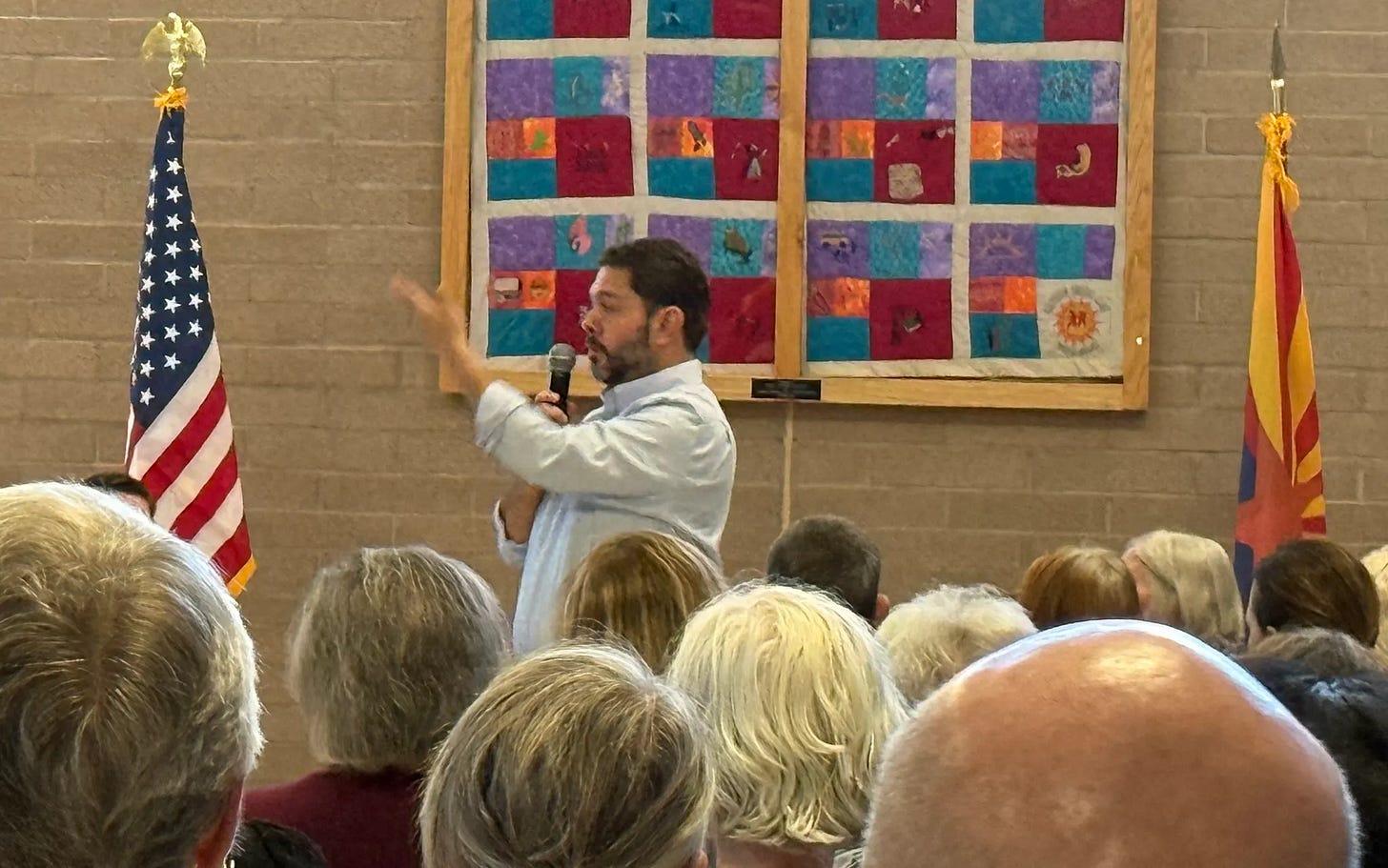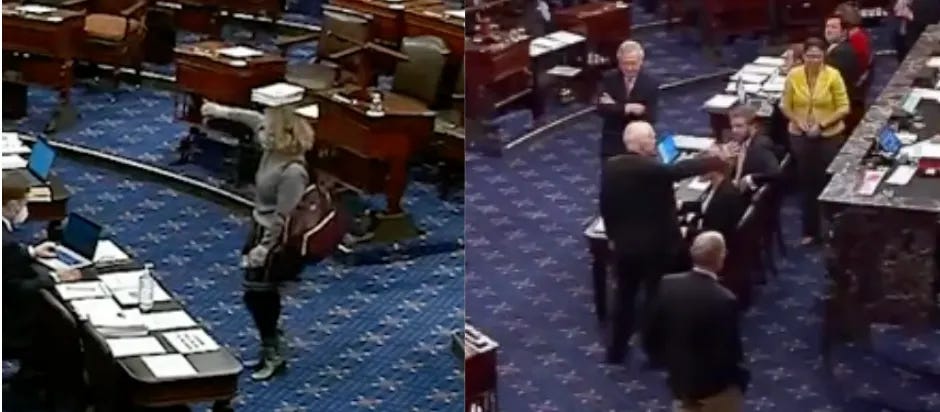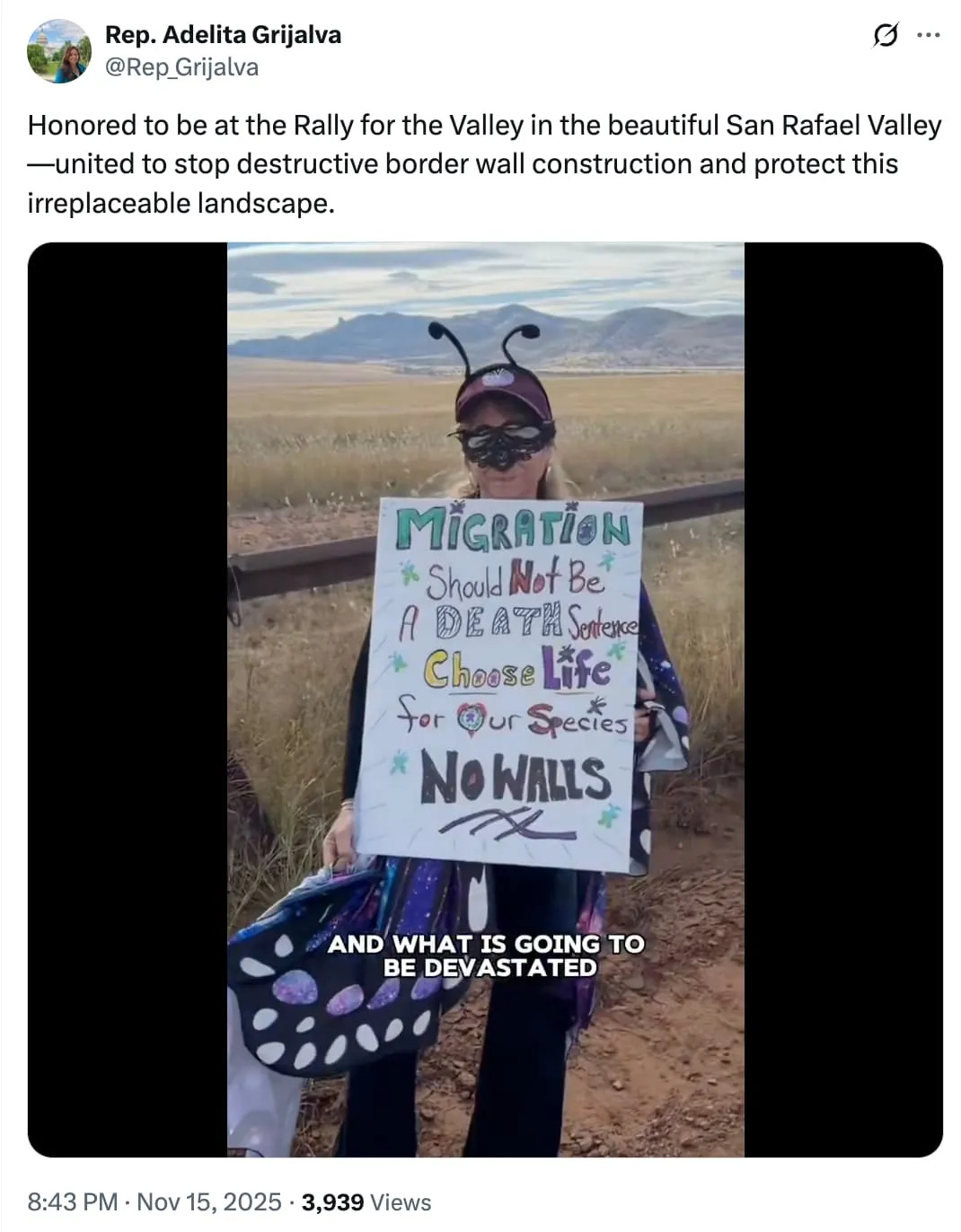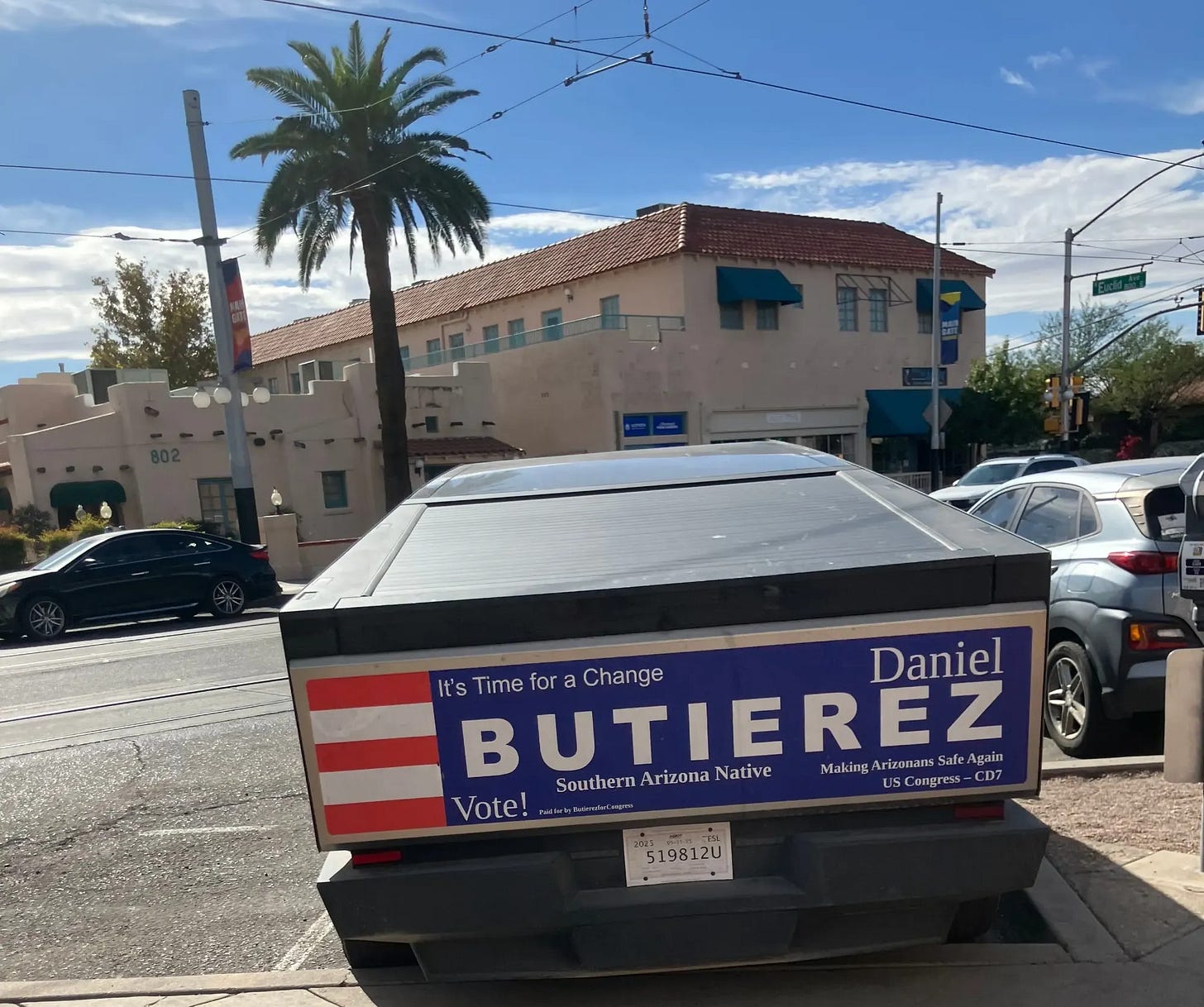Going where Ciscomani won’t
Gallego gives CD6 a real event … Project Blue never quits … And that’s quite a bumper sticker.
Arizona’s junior senator, Ruben Gallego, held a public town hall on Friday in Tucson — deep in Rep. Juan Ciscomani’s congressional district.
The Tucson Republican congressman didn’t attend the forum — which was part of Democrats’ effort this year to highlight that Ciscomani won’t meet with constituents and hasn’t held a true town hall in several years.
Our apologies to Ciscomani, but we aren’t going to count the invite-only roundtable in Green Valley as a town hall.
To be fair, this isn’t the first time Gallego has held this kind of political stunt — he hosted a similar town hall in 2017 to highlight that then-Rep. Martha McSally wasn’t holding town halls and had stopped talking to the local press.
It was a legit town hall
While Gallego was introduced by Tucson Mayor Regina Romero and had councilmembers Paul Cunningham and Rocque Perez in the audience, this wasn’t a political event where Democrats lobbed softballs at him.
The roughly 100 people in the audience came armed with serious policy questions for Gallego about healthcare issues—some were there nearly an hour before it started.
Fresh off the largest government shutdown in history, House Speaker Mike Johnson’s refusal to seat Adelita Grijalva for 50 days after her election, and the vague commitment by Republicans to talk about healthcare tax credits before January 30, there was a lot of mistrust in the audience of what Congress would do — or not do — in the next few months.
In the second term of Donald Trump’s presidency, distrust is widely pervasive — especially among Arizona senators.
The thumbs down from Sen. Kyrsten Sinema on a Biden-era $1.9 billion bill to raise the minimum wage and then-Sen. John McCain’s pivotal thumbs down to kill a measure that would have dismantled the Affordable Care Act are ingrained in the minds of Tucson voters.
During the town hall on Friday, Gallego praised McCain for his vote in 2017.
“I was there when I saw the courageous act of Senator McCain when he realized that there was no solution that is going to end up making this country healthier, safer, and that hundreds of millions of Americans were going to be affected in a negative way,” Gallego said.
Gallego refused to vote to end the shutdown without the inclusion of a solution to include tax breaks for the ACA, and was disappointed in his fellow Democrats who eventually folded and accepted a deal without those protections.
“I actually don’t even think it takes that much courage to say I want to protect 24 million Americans from having their previous premiums doubled,” Gallego said.
But the audience pushed back, asking Gallego to do more in his role as a Senator.
One push came from Tucson pediatrician Eve Shapiro, who wanted to know why Gallego signed on to Sen. Bernie Sanders’ legislation that would offer Medicaid for everyone as a U.S. Representative, but not as a Senator.
“I think these issues with Medicare, Medicaid and the ACA reveal the inadequacy of our health care system. It fails in cost, quality and access to care. We need something different,” she said. “These are band aids and we need to fix our healthcare system.”
Gallego, for his part, said he was “agnostic” about how to get to universal healthcare, but doubted that a solution would move forward while Republicans control the House, the Senate and the White House.
“There are a lot of systems in this world that will get us to what you’re desiring. It’s not just Medicare for all. I think that’s definitely one solution,” Gallego said. “So what I say is whatever result gets us to lower healthcare costs, universal coverage, you know, the patient being centered. That’s the way we’re going to go now.”
In other words, he argued that it is less important that he sign onto Sanders’ bill specifically if another bipartisan bill gets the same results.
For now, he is focused on extending the ACA tax breaks.
“But in the meantime,” he said. “I want to make sure that we get these extensions.”
An emergency general surgeon at Tucson Medical Center told the senator that every day she gets calls from smaller, rural hospitals that are not equipped to handle some cases, and that the local emergency rooms are filled with uninsured people who are coming in as a last resort — flooding the hospitals with more patients than they can treat. She asked Gallego what state and federal officials can do to address the issue.
Gallego didn’t answer directly, instead pivoting to his days working in the statehouse to expand Medicaid with then-Governor Jan Brewer.
He then turned to rural hospitals, which are struggling because of cuts made to Medicaid this summer in the “One Big, Beautiful Bill” act. A rural hospital might shut down its maternity ward, he said, forcing patients to travel to Tucson, Phoenix or Flagstaff to get the care they need.
The long-term cost, he said, would be the loss of trained medical personnel in rural areas. He worries it would take Herculean efforts to bring doctors, nurses and other trained medical professionals to rural areas of the state.
The vote to save healthcare
So where does the fight go next?
At this point, we are waiting for the Trump administration or Republican leadership in the House and Senate to reveal their plan to address the sharp spikes in health care premiums and the estimated millions of Americans who will be priced out of health insurance.
And in case it hasn’t been mentioned, a sharp spike in uninsured people flooding into rural hospitals is going to strain those hospitals to the financial brink.
Some rural hospitals will be able to handle it, experts predict, while others are telling Gallego and other members of Congress that they will close if the legislative branch fails to act.
Friday’s event gave us a better understanding of where Gallego is on the issues.

As for Ciscomani, we wish we could hear from him directly on these questions.
Maybe someone should have brought cardboard Ciscomani or left an empty chair at Friday’s town hall.
Speed up or slow down: The Project Blue developers are trying to close on the purchase of 290 acres from Pima County by Christmas, the Tucson Sentinel’s Paul Ingram reports. To speed up the process, Humphrey’s Peak Properties is willing to waive closing conditions tied to water and electricity, as well as annexation by the City of Tucson. At the same time, Supervisor Andrés Cano wants the county to slow down, saying county officials didn’t “read the fine print” when they agreed to sell the land to Humphrey’s Peak.
Not unscathed: The federal government shutdown is over and SNAP benefits are flowing again, but SNAP recipients still feel the pinch, KGUN’s Craig Smith reports. Some of them had to burn through what savings they had to buy food, as well as deal with the stress of watching SNAP benefits used as a political pawn.
“I was in a panic. I didn’t know how I was gonna get food,” Tyandrah Ashley told KGUN. “I think the first thing that came to mind was I had to donate plasma to get by.”
A little bait and switch: Green Valley residents filled a meeting room last Thursday for what they thought would be a chance to voice their opposition to the Copper World mining project. Instead, they watched a presentation about leaky toilets and freezing pipes, much to their annoyance. The unusually good showing for the annual presentation came after Save the Santa Ritas sent out a mailer because the group was upset local officials were focusing on small-scale issues when the mine would use so much more water, the Green Valley News’ Jorge Encinas reports.
“Community Water said more than 120 people showed up. A water company staff member told the Green Valley News the annual workshop had just two attendees last year, and one of those showed up by mistake,” Encinas writes.
The 20-count elephant in the room: The Mercado District is bearing long-awaited fruit with new housing projects, and that’s brought a lot of goodwill to two of the main developers. But a 20-count indictment is casting a shadow on those developers as they try to realize their vision of a “public market district,” writes Arizona Daily Star columnist Tim Steller.
We’ve got a vision for a “public news district” that you can fund by clicking this button. Plus, no indictments to worry about!
End of the road: A 13-year-old mountain lion was euthanized after spending 12 years as a beloved resident of the Arizona-Sonora Desert Museum, per KVOA’s Marissa Orr. The lion, named Cruz, was getting old and suffered from arthritis and other medical problems. In 2013, he was rescued from San Jose, California where he was found malnourished and later deemed unsuitable for release into the wild.
A Tucson Agenda reader spotted this rolling billboard cruising around the University of Arizona over the weekend.
Republican Daniel Butierez has already taken two swings at the Grijalva political dynasty — first against Raúl Grijalva in 2024, then Adelita Grijalva this summer — so it’s not a stretch to think he’s gearing up for attempt number three. (For what it’s worth, he hasn’t filed anything with the FEC… yet.)
And hey, if nothing else, this is a major upgrade from the bare-metal, straight-off-the-lot Tesla Cybertruck look.








If it weren’t for Jim Click's major campaign contributions and business support, Rep. Ciscomani would already be a struggling Republican candidate in AZ CD6. Ciscomani has voted to cut Medicaid for tens of thousands of his constituents in his Congressional District and to end SNAP food stamp programs for children, not to mention removing support for rural hospitals. He consistently opposes healthcare assistance for his voters and has voted against it on the House floor every time it has been proposed. Yet, he has the audacity to send letters to government agencies begging them not to remove taxpayer-funded Medicaid, food stamps, hospital support, and Affordable Care Act (ACA) coverage. That is some audacity. Ciscomani is nothing but a deceitful, spiteful man, hiding from voters and acting like a contemptuous, scaredy-cat when it comes to holding town hall meetings. Ciscomani is Arizona’s national embarrassment!
Thank you for sharing details from the town hall. I’m trying to keep a pulse on how our healthcare ecosystem is being impacted. That cardboard cutout is the closest we get from him.